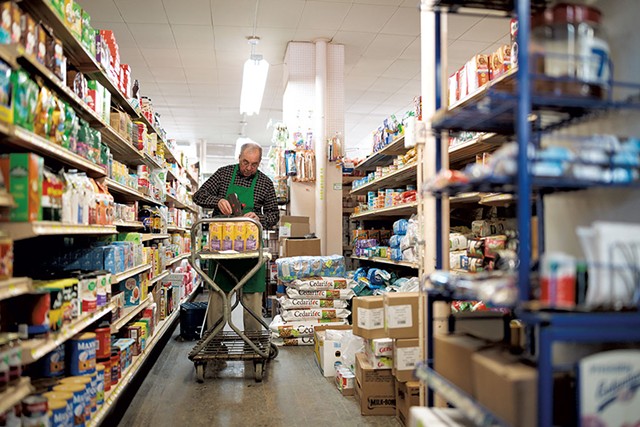
- Ben Deflorio
- Melvin Coburn stocking shelves at Coburns' General Store
When three members of the Coburn family got sick over the Christmas holidays, they published a plea on the town email list for volunteers to help at their family-owned store in Strafford. Neighbors responded with more offers than they could accept.
"A lady who just moved here from Florida was down here stocking shelves," said Sue Coburn, who, with her husband, Melvin, has owned Coburns' General Store for nearly 46 years. "One of his doctors who lives in town was here breaking down boxes."
That public spirit is embedded in the store, which is also home to the South Strafford Post Office and a tiny branch of Mascoma Bank. Locals stop by to talk baseball with Melvin; the Coburns stock neighbors' crafts and baked goods along with the groceries. Their daughter, Chrissy Jamieson, has worked there full time for 25 years.
The family cherishes the institution they've stewarded for so long and its role as a social hub of the close-knit town. But with Melvin, 78, facing health problems, the couple are looking for a way out.
Passing a life's work on to new owners isn't simple. It takes time, luck and planning for a business owner to realize a return on the time and money they've invested. Those who want to sell only to a buyer who will retain the character of the business — as the Coburns do — face additional hurdles in finding the right match.
With their retirement assets tied up in the store, Melvin and Sue, 77, are willing to wait. They're adamant that they don't want to sell to a convenience chain such as Maplefields. They'd like to see it remain a family-run business.
"We're here until someone comes along," Sue said.
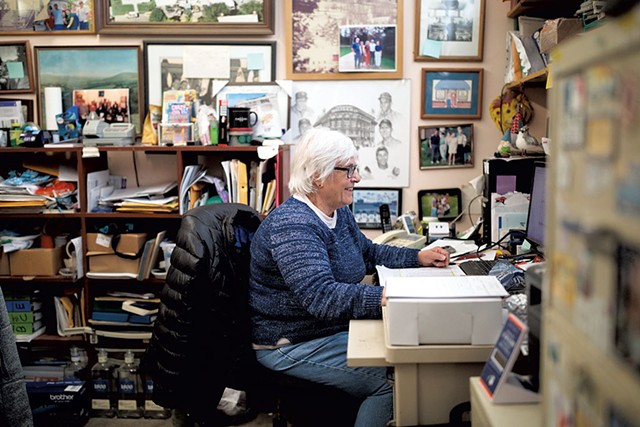
- Ben Deflorio
- Sue Coburn in the office at Coburns' General Store
Vermont has one of the oldest populations in the country and, in turn, plenty of business owners who are reaching — or have reached — retirement age. According to the research group Vermont Futures Project, more than a quarter of the state's population is expected to be over age 65 by 2030. The population of 35- to 49-year-olds has dropped by 15 percent over the past decade.
Some of those older owners have children with the interest — and skills needed — to take over; others have exit plans that would involve passing ownership to employees.
But many put off planning. Succession can be a tricky topic for owners to broach with their staff, because they don't want the workers to worry that their jobs are not secure, said Lynne Silva of the Silva Group, a business brokerage in Burlington.
Silva thinks that fear is misplaced. In her experience, employees are relieved, not alarmed, to hear that there's a plan for the change that's coming.
"The staff are fully aware of how everyone is aging," she said.
A 2021 study from Pricewaterhouse-Coopers found that only about one-third of family businesses in the U.S. had a "robust, documented and communicated" succession plan in place. Failure to prepare, the accounting firm said in the report, raises the risk of family conflict and the hasty appointment of a successor who might not be up to the job.
Some owners don't make a plan because doing so can mean hiring consultants to get their books in order for banks and would-be purchasers. And it can be difficult to put an accurate value on a small family business when trying to account for family labor and property, especially if record keeping has been informal.
"Often, the small business has a lot of personal expenses, like the business owns the [family] vehicle," said Adam Grinold, executive director of the Brattleboro Development Credit Corporation, which helps with business ownership transitions. Grinold and his wife also own a restaurant. "You have to make sure only true businesses expenses are in there."
Some simply don't want to give up their role in the company they built.
"I am working with people well into their seventies who are only just now starting to think about a succession plan," Silva said. "They like what they're doing."
There are, of course, people on the other end of the spectrum. John Beal, who owns Vermont Business Brokers, sees many owners in their fifties who decide to exit because they could make more money, in fewer hours, by working for someone else.
"You're used to working 50, 60 hours a week," he said. "In today's labor market, you can go out to the job market and open at $24 an hour and get overtime and have your weekends free."
Still, planning ahead doesn't protect sellers from all the bumps in the road. Tom Peterson of South Burlington started preparing well in advance of selling his 20-year-old project management consultancy to his workers last spring. Talks became unexpectedly contentious.
"It was, at times, frankly gut-wrenching," Peterson, 67, said. "This time a year ago, I was losing sleep and probably getting an ulcer."
Ultimately, he provided financing for the closing and walked away satisfied with his return on the 20 years he had invested.
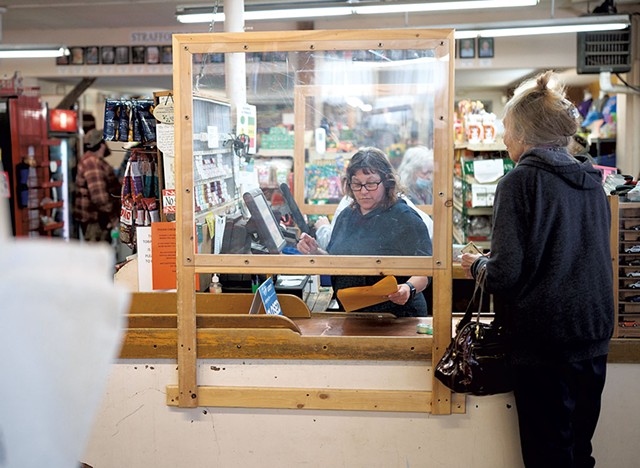
- Ben Deflorio
- Chrissy Jamieson at checkout at Coburns' General Store
Nationally and in Vermont, there are only a few legal ways to pass on a business. Transferring it to family members is one. That's how Lindsay DesLauriers ended up as part-owner, president and CEO of the Bolton Valley Resort. Her family owned the place, and DesLauriers grew up working there, until it was sold in 1997, when she was 17. The family purchased it back with the help of investors in 2017.
Before the sale, one of DesLauriers' first jobs at Bolton was stuffing envelopes with marketing mailers. She also did some restaurant jobs at the resort before heading off to college. DesLauriers was a lobbyist for years, then returned to run the resort with her father, who is chair of the board. Two of her four brothers also work at Bolton.
"Everybody has found a niche that makes sense, and it happened to be that this one made sense for me," she said.
Converting to employee ownership — where full-time employees become co-owners — is increasingly popular, Silva said. Over the past 20 years, the nonprofit Vermont Employee Ownership Center has helped more than 20 businesses make the transition. But the process is more complicated than selling outright, and the seller often has to wait years to get paid. Additionally, the administrative costs of setting up employee ownership can be steep.
Another common solution is a straightforward sale.
Nancy and Tony Tirozzi bought Riley's Fish Shack restaurant in St. Johnsbury last summer after moving from Massachusetts to be closer to their grandchildren. Riley Rutchuck and Jessie Davidson, a mother and daughter team, had put the four-generation family business on the market three years earlier.
Tony Tirozzi expected to specialize in pizza and grinders, as he had at other restaurants. But he ended up spending a few days in the kitchen with the Fish Shack's former owners, learning how to make some of their dishes. Fish stayed on the menu, and the new venture was named Papa Tirozzi's Bakery, Pizza and Fish Shack.
The Tirozzis had many restaurants to choose from; brokers say there are way more eateries for sale these days than there are buyers. Restaurant owners are exhausted, said Dick Palmer, a business broker in Quechee who runs a company called Hospitality Consultants.
"If you walk into any restaurant and ask if it's for sale, they'll say yes," said Palmer, who has been selling hospitality businesses for 60 years.
"COVID has really taken a toll on the industry," Palmer said. "They cannot get the help they need."
Farms are also changing hands at a rapid rate in Vermont, said Sam Smith, farm business director at the Intervale Center in Burlington. He helps farmers put a price on their property and find a buyer. Smith said age-related retirements and mounting problems in the dairy industry — such as rising costs — have accelerated the pace of farm sales lately.
"More often than not, the farmer wants to see it remain a farm," Smith said.
There are plenty of people looking to farm, according to Smith. He and other business planners at the Intervale worked with about 150 farms last year, he said, and roughly two-thirds of those are now in the hands of new farmers. Although many farms are restricted by conservation easements, which tend to bring the sale price down, money is the biggest obstacle to transfers, especially in the past year or so, as land values have risen precipitously.
"On an average farm at this point, a 200-acre farm, they could easily have $1 million in assets," Smith said.
What's happening with dairy farms is similar to the plight of general stores — many of which have been rescued from closing through creative financing deals, donations and volunteer work by nonprofits. The Preservation Trust of Vermont, for instance, works to prevent some imperiled businesses from going under.
"It really needs to be a labor of love," the group's president, Ben Doyle, said of acquiring a dairy farm. "I think the same is true for general stores and other retailers."
Chrissy Jamieson said she sometimes feels guilty that she's not taking over Coburns' General Store after sharing the crowded office there with her parents for so many years. But she wants to spend more time with her kids and grandkids, who live in North Carolina.
With a full deli and meat department and few frills, the store has supported the three related families who own it for decades. Melvin Coburn bought it with his brother Philip in 1977, and those two families have run it together ever since, with Jamieson coming aboard in 1998. The store, which is listed for $1.3 million, hosts two rent-paying tenants, the U.S. Post Office and Mascoma Bank, and a small laundromat. The building includes a large undeveloped space upstairs, adding to the income potential.
"This is a great opportunity for anybody who has the resources to put office space or living quarters upstairs," Sue Coburn said. "But it will take a lot of money and energy, and we've run out of money and energy."


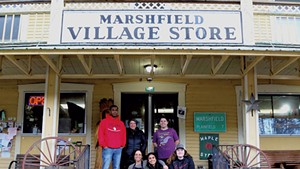
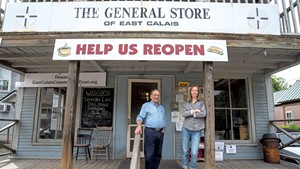









Comments
Comments are closed.
From 2014-2020, Seven Days allowed readers to comment on all stories posted on our website. While we've appreciated the suggestions and insights, right now Seven Days is prioritizing our core mission — producing high-quality, responsible local journalism — over moderating online debates between readers.
To criticize, correct or praise our reporting, please send us a letter to the editor or send us a tip. We’ll check it out and report the results.
Online comments may return when we have better tech tools for managing them. Thanks for reading.